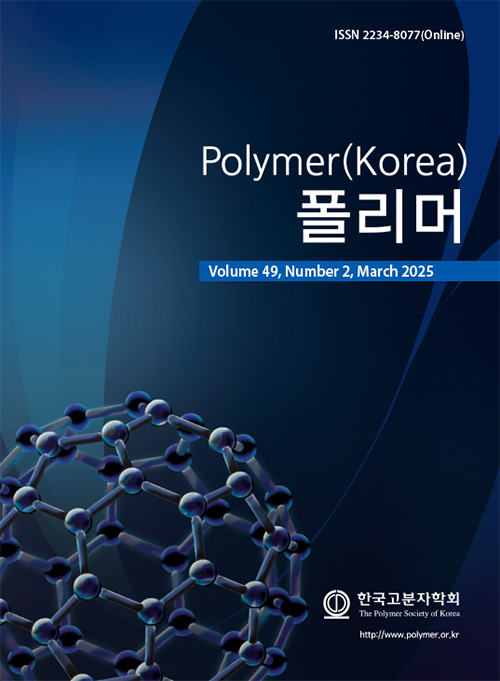- Preparation and Characterization of Novel Phosphorus-based Flame Retardant for Poly(lactic acid)
Department of Chemical Engineering, Kyonggi University, 154-42, Gwanggyosan-ro, Yeongtong-gu, Suwon 16227, Korea
- Poly(lactic acid)에 적용 가능한 신규 인계 난연제의 제조 및 특성
경기대학교 화학공학과
Reproduction, stored in a retrieval system, or transmitted in any form of any part of this publication is permitted only by written permission from the Polymer Society of Korea.
The novel butane-1,4-diyl tetraphenyl bis(phosphate) (PBP) was synthesized for enhancing the flame retardancy and mechanical properties of poly(lactic acid) (PLA). The chemical structure of PBP was confirmed via nuclear magnetic resonance (NMR) and Fourier transform infrared (FTIR). PBP makes the crystal more easily and rapidly during cooling process and enables the rearrangement of PLA chain at low temperature. Also, PBP increases the amounts of final maximum crystallinities. The tensile strength of PLA was enhanced from 23.8 MPa to 26.0 MPa for PLA-3, compared to pure PLA. These results can be explained that the PBP promotes the growth of the crystal of PLA matrix to improve the degree of crystallinity. The flame retardancy of PLA samples was evaluated via limiting oxygen index (LOI) and vertical burning test (UL-94). LOI value of 3 wt% PBP in PLA, increased from 22.8% to 27.1%, compared to pure PLA. It can be inferred that PBP can act as a condensed phase flame retardant mechanism.
Poly(lactic acid) (PLA)의 난연성과 기계적 물성향상을 위해 인을 함유하고 있는 새로운 난연제(butane-1,4-diyl tetraphenyl bis(phosphate), PBP)를 합성하였으며, 핵자기공명 분광기(nuclear magnetic resonance, NMR)와 푸리에 변환 적외선(Fourier transform infrared, FTIR) 분광기를 이용하여 확인하였다. PBP는 PLA 필름의 결정이 더 쉽고 빠르게 형성되는 것을 촉진하였으며, 더 낮은 온도에서 PLA 사슬의 재배열을 가능하게 하였다. 또한 PBP의 도입은 최종적인 PLA 결정 양의 향상을 가능하게 하였다. 이에 따라, 3 wt%의 PBP를 첨가한 PLA 필름의 인장강도는 순수 PLA 대비 23.8에서 26.0 MPa까지 증가하였다. PBP는 PLA 필름의 난연성을 향상시켰으며, 이를 한계산소지수(limiting oxygen index, LOI)와 수직 난연성 시험(vertical burning test, UL-94)을 통하여 확인하였다. 순수 PLA의 경우, 22.8%의 한계산소지수를 나타내었으며, UL-94 시험에서 난연 등급으로 분류될 수 없었다. 이에 반해, 3 wt%의 PBP를 포함하는 PLA 필름의 경우, 27.1%의 한계산소지수를 나타내며, UL-94 시험에서 V-0 등급으로 향상된 결과를 나타내었다.
Keywords: flame retardant, poly(lactic acid), crystallinity.
- Polymer(Korea) 폴리머
- Frequency : Bimonthly(odd)
ISSN 2234-8077(Online)
Abbr. Polym. Korea - 2024 Impact Factor : 0.6
- Indexed in SCIE
 This Article
This Article
-
2025; 49(2): 267-275
Published online Mar 25, 2025
- 10.7317/pk.2025.49.2.267
- Received on Jan 16, 2025
- Revised on Jan 31, 2025
- Accepted on Jan 31, 2025
 Correspondence to
Correspondence to
- Sang-Ho Cha
-
Department of Chemical Engineering, Kyonggi University, 154-42, Gwanggyosan-ro, Yeongtong-gu, Suwon 16227, Korea
- E-mail: sanghocha@kgu.ac.kr









 Copyright(c) The Polymer Society of Korea. All right reserved.
Copyright(c) The Polymer Society of Korea. All right reserved.